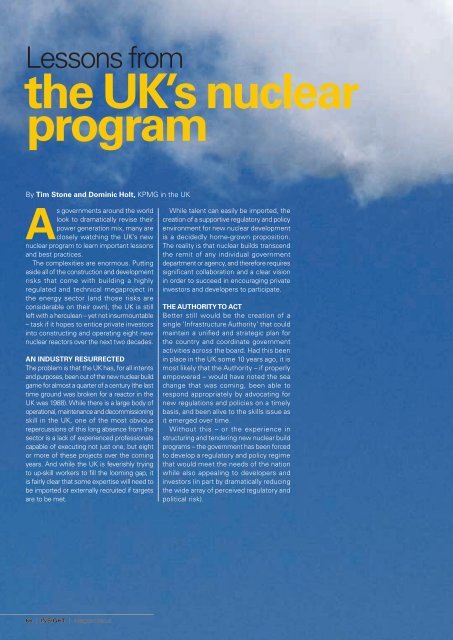Megaprojects - KPMG
Megaprojects - KPMG
Megaprojects - KPMG
Create successful ePaper yourself
Turn your PDF publications into a flip-book with our unique Google optimized e-Paper software.
Lessons from<br />
the UK’s nuclear<br />
program<br />
By Tim Stone and Dominic Holt, <strong>KPMG</strong> in the UK<br />
As governments around the world<br />
look to dramatically revise their<br />
power generation mix, many are<br />
closely watching the UK’s new<br />
nuclear program to learn important lessons<br />
and best practices.<br />
The complexities are enormous. Putting<br />
aside all of the construction and development<br />
risks that come with building a highly<br />
regulated and technical megaproject in<br />
the energy sector (and those risks are<br />
considerable on their own), the UK is still<br />
left with a herculean – yet not insurmountable<br />
– task if it hopes to entice private investors<br />
into constructing and operating eight new<br />
nuclear reactors over the next two decades.<br />
An industry resurrected<br />
The problem is that the UK has, for all intents<br />
and purposes, been out of the new nuclear build<br />
game for almost a quarter of a century (the last<br />
time ground was broken for a reactor in the<br />
UK was 1988). While there is a large body of<br />
operational, maintenance and decommissioning<br />
skill in the UK, one of the most obvious<br />
repercussions of this long absence from the<br />
sector is a lack of experienced professionals<br />
capable of executing not just one, but eight<br />
or more of these projects over the coming<br />
years. And while the UK is feverishly trying<br />
to up-skill workers to fill the looming gap, it<br />
is fairly clear that some expertise will need to<br />
be imported or externally recruited if targets<br />
are to be met.<br />
While talent can easily be imported, the<br />
creation of a supportive regulatory and policy<br />
environment for new nuclear development<br />
is a decidedly home-grown proposition.<br />
The reality is that nuclear builds transcend<br />
the remit of any individual government<br />
department or agency, and therefore requires<br />
significant collaboration and a clear vision<br />
in order to succeed in encouraging private<br />
investors and developers to participate.<br />
The authority to act<br />
Better still would be the creation of a<br />
single ‘Infrastructure Authority’ that could<br />
maintain a unified and strategic plan for<br />
the country and coordinate government<br />
activities across the board. Had this been<br />
in place in the UK some 10 years ago, it is<br />
most likely that the Authority – if properly<br />
empowered – would have noted the sea<br />
change that was coming, been able to<br />
respond appropriately by advocating for<br />
new regulations and policies on a timely<br />
basis, and been alive to the skills issue as<br />
it emerged over time.<br />
Without this – or the experience in<br />
structuring and tendering new nuclear build<br />
programs – the government has been forced<br />
to develop a regulatory and policy regime<br />
that would meet the needs of the nation<br />
while also appealing to developers and<br />
investors (in part by dramatically reducing<br />
the wide array of perceived regulatory and<br />
political risk).<br />
66 | INSIGHT | <strong>Megaprojects</strong>





![[2012] UKUT 399 (TCC)](https://img.yumpu.com/51352289/1/184x260/2012-ukut-399-tcc.jpg?quality=85)





![Neutral Citation Number: [2009] EWHC 3198 (Ch) Case No: CH ...](https://img.yumpu.com/50120201/1/184x260/neutral-citation-number-2009-ewhc-3198-ch-case-no-ch-.jpg?quality=85)





